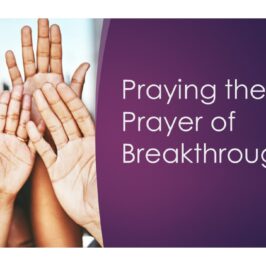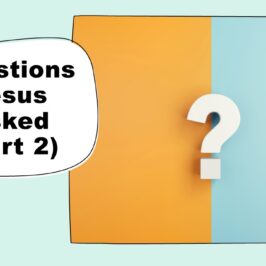TEXT: ‘I am the door. If anyone enters by Me, he will be saved, and will go in and out and find pasture’ (John 10:9). Doors are not a barrier to God, as the resurrected Jesus proved, ‘That evening the disciples were meeting behind locked doors, in fear of the Jewish leaders, when suddenly Jesus was standing there among them!’ (John 20:19 TLB). God has to work with our will, for that’s how He has chosen to do it. Reading the book of Revelation recently I noticed two doors – one shut, the other open and these form the basis for Today ‘s Teaching. 1. Shut Door A. Negative – ‘Behold I stand at the door and knock’ (Revelation 3:20) A church with Christ on the outside! What a contradiction. He’s patiently waiting to be invited in. However, He will not wait for ever, ‘I slept but my heart was awake. Listen! My beloved is knocking …… I opened for my beloved, but my beloved had left; he was gone’ (Song of Solomon 5:2, 6). Too slow to respond meant the Lord was gone. People wonder if God means what He says. ‘God is not a man, so he does not lie. He is not human, so he does...
Learn MoreTEXT: ‘Then she made a vow and said, “O Lord of hosts, if You will indeed look on the affliction of Your maidservant and remember me, and not forget Your maidservant, but will give Your maidservant a male child, then I will give him to the Lord all the days of his life, and no razor shall come upon his head’ (1 Samuel 1:11). 1 Samuel starts with this wonderful account of Hannah achieving her breakthrough. How do we react when we have the promise from God, but it remains an unanswered prayer? There are six things Today’s Teaching considers as we study, “Praying the Prayer of Breakthrough”. 1. Problem – ‘Hannah had no children … the Lord had closed her womb’ It wasn’t that she was physically incapable of birthing a child, she just couldn’t conceive. She felt in herself that everything was okay, yet month after month, year after year, no conception. The promise of God concerning childbearing remained unfulfilled, ‘Behold, children are a heritage from the Lord, the fruit of the womb is a reward’ (Psalm 127:3). You may have a different problem and promise. Naturally there doesn’t seem to be a reason why you cannot receive the answer. How quickly that kind of scenario can lead into depression. 2....
Learn MoreTEXT: ‘Therefore we also, since we are surrounded by so great a cloud of witnesses, let us lay aside every weight, and the sin which so easily ensnares us, and let us run with endurance the race that is set before us, looking unto Jesus, the author and finisher of our faith, who for the joy that was set before Him endured the cross, despising the shame, and has sat down at the right hand of the throne of God’ (Hebrews 12:1-2). In Part 1 we studied how the lives and faithfulness of past believers are encouraging us to continue in the faith. As Jesus is our supreme example and focus, we’re to look to Him because He is the author and finisher of our faith. In the epic film, “Chariots of Fire”, Eric Liddell (who later became a missionary to China) loved running and was an excellent athlete, even winning a gold medal in the 1924 Paris Olympic games. The film featured one race in which he slipped and fell while running. His competitors raced on ahead. What did he do? He got up and started running again and before long he retook the lead and won. As Christians it’s all too easy to slip and fall over, but don’t stay on the ground. Pick yourself up and continue because you...
Learn MoreTEXT: ‘Therefore we also, since we are surrounded by so great a cloud of witnesses, let us lay aside every weight, and the sin which so easily ensnares us, and let us run with endurance the race that is set before us, looking unto Jesus, the author and finisher of our faith, who for the joy that was set before Him endured the cross, despising the shame, and has sat down at the right hand of the throne of God’ (Hebrews 12:1-2). Many Christians say, “I just can’t do it, I can’t live the Christian life!” Even those thinking about turning to Christianity are sometimes deterred from doing so because of the high standards they feel they will not be able to live up to. Today’s Teaching seeks to counteract that misunderstanding and show how we can live the life God wants us to live. We can make it! Our text highlights three main reasons to help us say with confidence, “I am able to make it!” 1. Past Believers – ‘Therefore we also, since we are surrounded by so great a cloud of witnesses’ Hebrews Chapter 11 names sixteen Old Testament believers, plus unnamed ones, whose testimonies should spur us on. We read how when they faced insurmountable problems and difficulties, God brought them through into victory or helped them to...
Learn MoreTEXT: ‘And when He had come into the house, the blind men came to Him. And Jesus said to them, “Do you believe that I am able to do this?” They said to Him, “Yes, Lord.”’ (Matthew 9:28). In Part 1 we focussed on questions Jesus asked about personal salvation. Through those, Jesus revealed how much He values each individual person; how much compassion He has for those in need; how people need a revelation to see their need of Him; how there needs to be miraculous demonstrations following the preaching of the gospel, so the lost know we are speaking the truth! Now we consider questions Jesus asked those in need of healing, to reveal and reward faith. Healing 1. To discover facts Jesus asked the demoniac, ‘What is your name?’ (Mark 5:8). He said to the crowds, ‘Who touched My clothes?’ (Mark 5:31). He asked the epileptic’s father, ‘How long has this been happening to him?’ (Mark 9:21). Jesus asked brief questions. Sometimes too much investigation into the problem can talk ourselves into unbelief! When Jesus saw the crowds were confused by His disciples’ inability to cast out the demon from the epileptic son, and that the demon was tormenting the son once again, He immediately dealt...
Learn More





Recent Comments